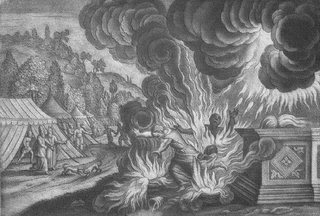Hell: Wrath for Restoration?

Spring break is finally here… well right after my next class. I don’t know how much bloging I’ll be doing down in San Diego so my posts may be scarce through this next week.
I’ll leave you with these questions that I’ve been thinking a lot about:
Does God ever do anything destructive without the intention of reconstruction? In other words why does God punish? Does He punish simply because of wrongdoing or does He punish to make the world a better place? For example; why did God send the flood? Was it really just to destroy or was it to restore? Is God’s wrath for restoration?
So this leads into the real question. What is Hell? Is Hell just for God’s wrath or is it for restoration? Is Hell wrath for restoration?